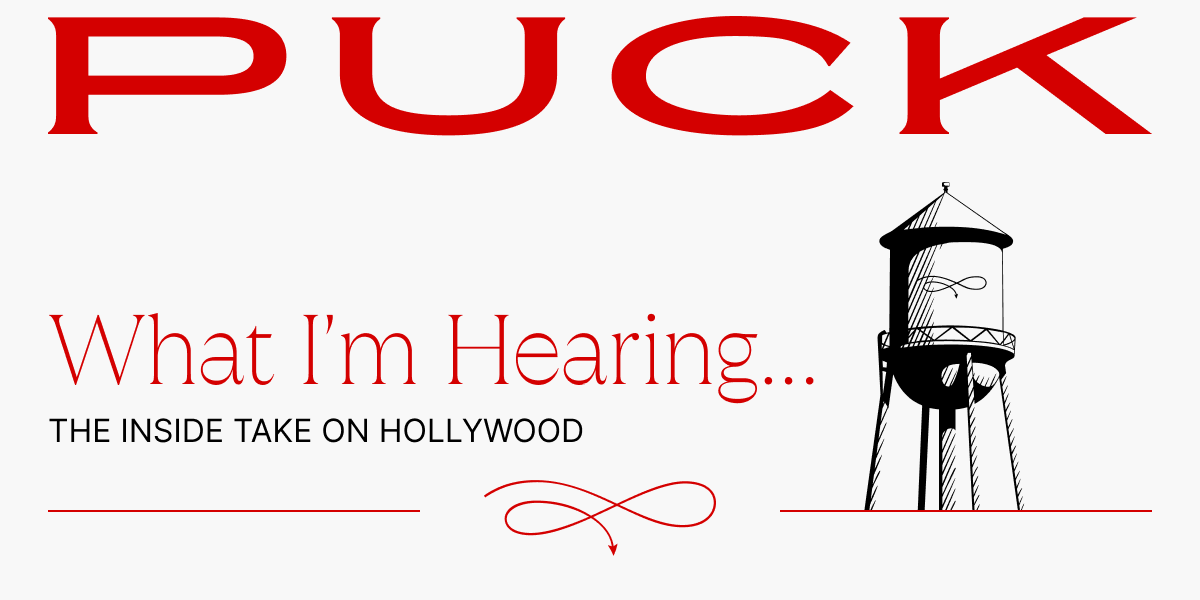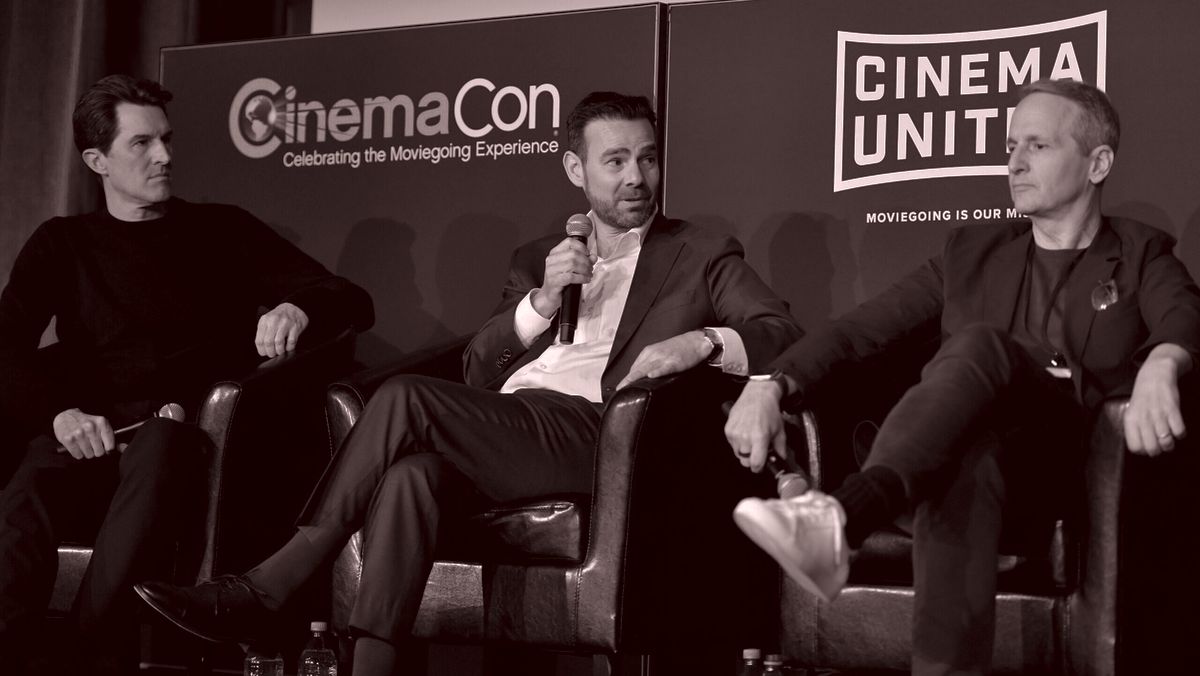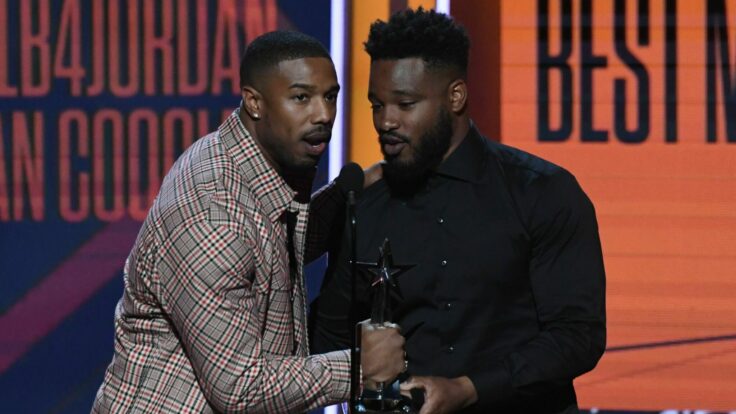Welcome back to What I’m Hearing, jetting home from Vegas after four wonderful days of movie
studio marketing and second-hand smoke.
After years of attending CinemaCon, I sat through all seven presentations for the first time, and while there was compelling footage—Lionsgate’s John Wick spinoff, Ballerina, and Amazon/MGM’s Ryan Gosling sci-fi thriller, Project Hail Mary, were highlights—the existential anxiety among theater operators seemed even higher than usual. You could feel it in the urgency of the exhibitor speeches, the
whispers at parties, and the lines drawn publicly in the sand on 45-day windows. Collectively, the mood seemed to be, Dammit, this was supposed to be our comeback year! Seriously, now what?…
Anyway, thanks to everyone who came to my all-star panel on Tuesday. Tonight I’ve got some highlights and news-making moments from that event, plus my own special version of CinemaCon awards based on the presentations and the upcoming slates…
🚨🚨 Puck’s awards season
event returns!: I’m happy to announce that Stories of the Season, the big F.Y.C. gathering we launched in November, will return for the TV awards season, on May 20 in Hollywood. And I’m very happy to reveal John Mulaney will be our keynote guest for a live recording of The Town. We’ll also have interesting groupings of the season’s top talent, and an exclusive reception with fellow What I’m Hearing readers. Remember, unlike a lot of F.Y.C. events, this is
not a pay-to-play situation. All the participants in Stories of the Season are chosen by me and my fellow Puck authors, and the event is by invitation only. If you’d like to attend, please email Fritz@puck.news.
Still not a Puck member? Just click here. Got a news tip or an idea for me? Just reply to this
email or message me on Signal at 310-804-3198.
Let’s begin…
|
In honor of the fake awards handed out by theater owners at CinemaCon, let’s bestow
some special honors based on my four days of movie studio presentations, parties, and buzz inside Caesars Palace…
Most Interesting Presenter Who Didn’t Actually Present
Eddy Cue. The Apple services V.P., who will ultimately decide whether the world’s largest company releases movies in theaters, made his CinemaCon debut not onstage—Warner Bros., which is distributing F1, showed 10
minutes of Apple’s Brad Pitt racing movie—but in quiet meetings with top theater executives. Two people who met with Cue told me they came away cautiously encouraged, despite last year’s Wolfs debacle and the company’s recent pullback on theatrical ambitions.
Cue, along with content co-chief Zack Van Amburg and film head Matt Dentler, is said to have recommitted to making more than 10 Apple Original Films per year. He stopped
short of saying definitively whether Apple films will play in theaters—and, if so, for how long—but his appearance at a theater convention signals at least his continued interest. “I can say that AMC was immensely pleased and encouraged by Apple’s enthusiasm for making movies,” my friend Adam Aron, C.E.O. of AMC Theatres, told me of his Cue sit-down. “We are particularly excited about Apple’s F1, and we will do everything we can to lean in and support the
success of this new movie, which we believe will be a global sensation.”
Most Ominous Omission
Michael. Lionsgate’s Adam Fogelson sidestepped his delayed Michael Jackson biopic, and I’ve confirmed the planned Oct. 3 release date is almost certainly not happening due to the massive third-act reshoots I wrote
about in January. That rework made a long movie even longer, so producer Graham King now wants to split Michael into two parts, a risky move that could cause Universal, which is distributing internationally, to opt out if it chooses. Those talks haven’t happened yet.
Strongest Flex
Netflix, for the news
breaking during CinemaCon that David Fincher would
direct a Once Upon a Time… in Hollywood follow-up with Brad Pitt, from a script by Quentin Tarantino—a project 10 times more interesting than nearly all the movies flogged this week for theaters.
Least Convincing “I’m Sorry I Couldn’t Be There” Video
Mahershala Ali, who plugged his upcoming Your Mother Your Mother Your Mother at the Amazon/MGM presentation via
prerecorded message because he “couldn’t make it”—despite having appeared a few hours earlier in person on the same stage to plug Jurassic World: Rebirth.
Best Quote
Richard Brener, the longtime New Line executive, who followed up the over-the-top gory footage from Final Destination: Bloodlines with a deadpan, “See you at the Oscars.” I laughed.
Best Quote From Jeremy
Strong
“I see Jon as the Lewis to Bruce’s Clark.” —Strong, plugging his role as Springsteen manager Jon Landau in Disney’s Deliver Me From Nowhere, with a batty yet on-brand line we will likely hear 1,000 times this year.
Largest Elephant in the Room
A tie! Amazon’s Mike Hopkins did not thank or mention
Jen Salke, whom he just ousted as this top content executive. Nor did Mike De Luca and Pam Abdy reference the drumbeat of rumors around their future at the company, even humorously. Paramount’s Brian Robbins did note “all the noise” at the parent company, but not that this was almost certainly his last CinemaCon running the studio.
Biggest Question Mark
Superman.
Lots of love and hate from people I talked to for DC’s alternately silly and spectacle-ish footage of James Gunn’s make-or-break reboot. Star David Corenswet was pretty stiff in the Q&A, but Gunn seemed happy with the unveiling because he put the footage
online… right before Marvel’s presentation today.
Jazziest Hands
Lionsgate, which
followed the chaotic and confusing footage of Abel Tesfaye’s new movie, Hurry Up Tomorrow, with a stunty and loud live performance from his alter ego, The Weeknd, that made everyone instantly forget about that bad trailer.
Most Hyperbolic Hype Man
Jim Orr. The Universal distribution chief declared Chris Nolan’s in-production The Odyssey a “cinematic
masterpiece that Homer himself would quite likely be proud of.” A blurb from an 8th century B.C. author who may or may not be a real person has gotta be a Hollywood first.
Best Non-Announcement
Amazon/MGM couldn’t close his deal in time for CinemaCon, but Guy Ritchie is in negotiations to direct Roadhouse 2, with Jake Gyllenhaal returning and Will Beall writing. Amazon
declined to comment, but if this one adheres to Amazon’s new theaters-first strategy, it might trigger a full-on stroke for Doug Liman, who directed the first one and went scorched earth on Amazon when he didn’t get a theatrical release.
Largest Chasm Between Words and Actions
Tom Rothman, the Sony Pictures chairman, who again declared himself defender of the theatrical experience while
tap-dancing his way through a presentation that featured Spider-verse in 2027 and The Beatles in 2028 but shockingly few 2025 releases for theaters.
The Alto Knights Award
James L. Brooks, the 84-year-old filmmaker who appeared to promote his in-production dramedy, Ella McCay—which doesn’t exactly seem like a movie a Disney label would make if
Brooks didn’t have a key relationship with the company via The Simpsons—and name-checked C.E.O. Bob Iger for personally—personally!—reading his script.
Saddest Distribution Headline During CinemaCon
Ron Howard, the Oscar-winning legend who is portrayed on this week’s episode of The Studio as a still-powerful filmmaker, announcing that his TIFF film, Eden, with hot stars
Ana de Armas and Sydney Sweeney, was finally picked up by… the tiny indie outfit Vertical, which set a late August–dump release date. Yikes. (Hilariously, Howard’s Imagine even got the Deadline
stenographer to
suggestthe film didn’t sell at Toronto because someone had a medical emergency during the premiere.)
Worst Media Person
Sharon Waxman, of The Wrap, who was nearly kicked out of the Universal presentation for insisting on using her phone outside the designated media area despite repeated admonitions from security.
Funniest Press Section Reaction
“Is this
real?” Overheard multiple times when Amazon/MGM announced the Hugh Jackman–Emma Thompson sheep detective movie, Three Bags Full.
|
Box office over/under: I think A Minecraft Movie is gonna work, or at least hit the over on
$65 million domestic. Long-term prospects? Much dicier.
Now on to the highlights of my CinemaCon panel…
|
|
|
At CinemaCon, the fight for the 45-day theatrical window was all anyone could talk about. So
I assembled a team of industry players to survey the battlefield and attempt to find a solution.
|
|
|
Hollywood studios famously leveraged the Covid pandemic to reduce theatrical windows from the once-standard
90 days to 45 days and, in many cases, much less. Premium video on demand has since emerged as a window that can deliver as much as $100 million in added revenue on a studio hit like Wicked, but how much of that effectively comes from the pockets of theater owners?
That issue exploded this week at CinemaCon, the annual theater operator convention. I hosted a panel for Cinema United specifically to explore the topic with an enviable lineup of stakeholders: Regal Cineworld C.E.O.
Eduardo Acuna, F1 filmmaker Joseph Kosinski, NBCUniversal chairman of global distribution Peter Levinsohn, and Neon C.E.O. Tom Quinn. Here are the highlights from our conversation (edited for clarity and brevity, of course).
|
Matthew Belloni: We heard a lot this week about reinstating the 45-day window. To me, this
should be easy. What if the big chains just said, “We will not play your movie if you do not give it a meaningful theatrical release.” Why is that not happening?
Eduardo Acuna: In my life, I don’t think I have ever said to any studio, “I will not play your movie.” I hope it doesn’t get to that, but I do think there’s momentum for a 45-day window.
Matt: Maybe I’m cynical, but nobody does anything unless they absolutely have to. And what we’ve seen
post-Covid is that the financial interest for the studios is to utilize theaters when it benefits them and premium video on demand when it doesn’t. How do you better insert the theaters into that equation?
Eduardo: My big preference would be that this comes out of discussions and agreements. Michael O’Leary [of Cinema United] showed how the markets with longer windows have recovered better after Covid. That certainly happens in our theaters. We have one
very big issue, which is piracy. The second a movie goes out on P.V.O.D., piracy just explodes… worldwide, it’s a huge problem, and we’re losing a lot of box office.
Matt: Peter, whenever I raise this with Universal, you pull out a phone book worth of stats that show P.V.O.D. does not hurt theatrical grosses. I frankly don’t believe that. Can you be certain that P.V.O.D. does not hurt theatrical grosses when these movies are going to P.V.O.D. two, three, four
weeks after release?
Peter Levinsohn: We are a theatrical-first company, as everyone knows. It’s the underpinning of every single thing we do. It’s where the brand is created. And it is the proxy for value in all the ancillary windows. So we have no interest in hurting theatrical. The second thing we prioritize is that we need to be where the consumer is, and the consumer is not going to go to see every single movie in the theater.
Over the last couple of years, we
really fine-tuned the optimization on the windowing, which has made us more profitable, particularly on the small to mid-range films, which are largely the ones that have had a problem post-pandemic. That ability to be more profitable has allowed us to make more movies—and there’s no question that we have by far the biggest slate in the industry—and we’re only able to do that because of the improved economics.
Matt: Don’t you worry that you are training casual
moviegoers to wait? Because opening weekends are down slightly, but second and third weekends have fallen off a cliff.
Peter: All of our big films do not go to [Peacock] until at least 120 days.
Matt: So, Black Bag, a recent Focus movie I saw in the theater and really liked, is in that category?
Peter: Black Bag is a smaller movie. Black Bag would go to [S.V.O.D. after] 90 days, but in time, a
large portion of the Universal slate will all be 120 days. So, we’re moving in that direction.
Tom Quinn: We will always believe in cinema-first. I would argue that instead of, I don’t understand why Regal or AMC or Cinemark can’t get together and demand 45 days, just simply change the rental [charges] of those companies that shorten their theatrical window. That’s the easiest way to handle it.
Matt: Meaning, change the amount that you pay
to show a movie based on how long a window you give? Eduardo, why doesn’t that happen?
Eduardo: It has happened. We have argued for breaks when the window is shorter, and we’ve had it sometimes. But I would actually be opposed to that, because I’m worried that we’re training our customers to know that the movie’s out at home very soon. The 12 largest exhibitors in the world sent a survey, and one in three [customers] believe that a movie is free at home in less
than 30 days. A normal customer doesn’t know the difference between P.V.O.D., transactional, subscription, nothing. They think it’s free [at home] in less than a month.
Matt: Well, why wouldn’t they think that? The studio marketing is telling them it’s going there soon. You go to a ticketing website like Fandango and often you see “buy it at home” right next to “buy tickets for theaters.” Why wouldn’t they think that it’s going there?
Eduardo:
Two years before the pandemic, when the window was 90 days, the median opening of a wide release was $17.5 million for the weekend. Last year, that was $11.5 million. In that same [pre-Covid] period, 23 percent of wide releases opened to less than $10 million. Now that number is 41 percent. So my concern is, even if we pay less to have a shorter window, we are training our customers to not go to the theaters.
|
Matt: Joe, you’re a filmmaker with choices. When you’re selling a project to various
suitors, what’s important to you?
Joe Kosinski: For me, on movies like Top Gun: Maverick, F1, and the movie we just sold to Apple, theatrical is a requirement. It’s my job to make a movie that the audience knows they have to see on the big screen. I can’t control the stuff you guys are talking about, but what I can do is try to make a film that, when the audience sees the materials for it, they say, I gotta see that on the biggest screen
possible.
Matt: How close was Top Gun: Maverick to going to Paramount+ during the pandemic?
Joe: You know, I wasn’t a part of those discussions—
Matt: Come on. They’re not going to loop you in?!
Joe: I had Jerry Bruckheimer and Tom Cruise, who are both legends and were able to take care of that for me. (Laughter)
Peter: I
agree with Joe completely that we should be thinking theatrical first. There’s a couple things I want to add. If you look at the decay curves of films that go a little bit early in the home digitally, there is no difference [from those that are available later]. And we study this quite a bit. Look at Moana 2 and Wicked. They’re almost the same [domestic] box office, they were released at the same time of the year, and one had a slightly earlier P.V.O.D. window, and their decay
curve looks identical. So, I’m not sure that the data Eduardo was citing really tells the whole story.
Matt: I hate to use the N-word here, but Netflix’s Ted Sarandos was at a conference just last week, and he noted basically every in-person experience has not only come back after Covid, but has gone through the roof—live music, sports, everything except movies in theaters, which are down 10 percent from last year, down 40 percent from 2019. And his quote
was, “You gotta look at that and say, What is the consumer trying to tell you?” What is the consumer trying to tell us?
Tom: One, look at the quality of the movies. We live in a streamer economy where movies are being made that don’t have to have any [audience] retention, right? Just box value, and I think a large slew of—
Matt: “Tile value,” I think they call it now.
Tom: It’s tile value. Looking at the
box office in 2023, just under 600 movies were released. The highest-grossing [domestic] box office year was 2018, which was $11.8 billion, but over 900 movies. And I would say more movies is not better. We need to focus on development. We need to move upstream. And I do think windows matter. Black Bag is a fantastic movie. Peter, you’ve done a great job. [Director] Steven Soderbergh killed it. My wife and I had an incredible night out. That movie should stay
in theaters for 88 days, just like Top Gun: Maverick, in my opinion.
Matt: But that movie cost $50 million and will not make back its budget in domestic box office. So, how is Universal supposed to make back its money in order to make more of those movies?
Tom: I would argue that you’re teaching the older audience that they don’t need to go see it in the theater. And I don’t know what the upside is of that film as a $20 V.O.D.
unit. I think that’s overpricing. It’s the whole approach to the post-pandemic P.V.O.D.—too high a price point, too short a theatrical window, and one size fits all. I wish there was more discussion between the V.O.D. providers, Comcast, the distributor, and exhibition to truly figure out a more nuanced window.
Peter: We do not have a one-size-fits-all strategy. We have some movies that go after the third weekend, some movies that go after maybe the sixth or
seventh weekend into the transactional side. We have multiple price points. And as I said, one of the things that we’ve been able to do over the last couple of years is take control of this optimization. Finding the right window at the right price point, in the right business model, as we try to make ourselves more profitable.
|
Matt: Tom, you had the Oscar best picture winner this year,
Anora. That film grossed $20 million domestic. You came on The Town and said that the battleground nowadays for most awards movies is P.V.O.D., not box office. Is the award season box office over for most movies? Is this now a P.V.O.D. race?
Tom: Anora is a $6 million movie shot on the streets of New York and Vegas. And it grossed just over $15 million. When it won, it grossed another $5 million. That’s the largest percentage increase since
Parasite. Anora was in theaters for approximately 70 days, a pretty extensive window. We were pushing for 90, but we wanted to launch V.O.D. around nominations, which is exactly what we did for Parasite. But the idea of putting that movie out for 30 days, 17 days, 45 days—I don’t think it would have been the hit and/or the best picture winner that it became.
Matt: Joe, what have you been able to glean from your conversations at Apple about their
aspirations for releasing movies—not just yours, but all their movies—in theaters? Because they have pulled back.
Joe: I don’t know Apple’s overall strategy other than that they’ve been very supportive of making sure F1 is a giant theatrical release all around the world. One of the reasons we went with Apple for F1 is because of their commitment to the theatrical release of the film. [Ed. note: Apple has not said what the exact
F1 window will be, but it’s at least 45 days.]
Matt: But some have described F1 as a make-or-break moment for Apple in theaters. Like, if F1 works as it’s supposed to, and it seems like it will, they are gonna continue to make these bets. If it doesn’t, you’re gonna see Apple pull back and not commit to theaters.
Joe: No pressure. (Laughter)
|
Matt: Eduardo, I wanted to ask you about this Narnia situation. Greta
Gerwig got Imax and Netflix to agree to a four-week window and a two-week commitment in theaters for Imax only. There’s been some reporting at Puck that some of the theater chains are not happy about that and have not committed to playing that movie. Where do you stand?
Eduardo: Greta is a fantastic talent. And I will
say that this movie doesn’t come out for another 18 months, and we don’t even know the economics or anything. But I will tell you a couple of facts: The first is, I’m a very strong proponent of a 45-day window. And giving a 30-day window [to Netflix, not even P.V.O.D.] is not in the best interest of exhibition. Secondly, I would say, there are two movies on that date [Thanksgiving 2026]. You have the new Hunger Games by Lionsgate. And they have an Imax commitment. Disney also has a
movie dated for that date. I assume it’s gonna have Imax. Who should we support? The studios who give us all these movies with very long windows—I mean, Disney has the longest window—or the studio who will maybe give us one movie ever and have a very short window?
Matt: So, you won’t play the Narnia movie in your Regal Imax theaters? (Laughter)
Eduardo: We don’t know what’s gonna happen.
Dates could change. I truly hope that Greta can convince Netflix to give it a longer window, and then we could play it. But it would not be in our best interest to play it.
Matt: Peter, can you share with us the ultimate P.V.O.D. number for Wicked?
Peter: I think it’s fair to say it’s the biggest P.V.O.D. title we’ve ever had. So, let’s call it somewhere in the neighborhood of $100 million, which is our share. So, if you just rounded that
up by two, that’s the equivalent of $200 million of box office.
Matt: Well, it’s equivalent to you, not to the theaters.
Peter: I understand. I’m just saying that enables us to have a big slate. We don’t pocket that money. We put that money right back into the production slate.
Matt: There was an announcement that the theater chains are going to spend $2.2 billion to upgrade theaters and add other
amenities. Is this about improving the movie experience or adding zip lines to the lobby?
Eduardo: Every exhibitor has their choices, right? I will tell you what Regal is doing. We will invest in anything that gives a good return, and we see the biggest returns are better seats, laser projectors, and good sound. We have to be a customer-centric industry. The big chunk is going to improve our current assets; HVAC units, projectors, seats, etcetera. And if we find
something that builds a better mousetrap, we’ll do it too.
Matt: Where do you stand on free-for-all theaters? Phones, talking, all of it.
Eduardo: Me personally, not a big fan. I’ve heard that we should bring back younger audiences by having texting auditoriums, and that we should sell weed in our theaters, and we should do all these other things… Listen, I’m not saying we’re never gonna test it. We should test
everything!
Matt: Finally, Joe, would you prefer your movies be released on 4,000 regular theaters or half the amount but all large format (P.L.F.) or Imax screens?
Joe: Hmm. You know, I love the Imax experience. I love the P.L.F. experience. So yeah, I guess I’d go P.L.F., selfishly. It’s about giving people something they can’t get at home.
|
See you Monday,
Matt
Corrections: Taylor Sheridan’s deal with Paramount
is up in 2028, not 2027, as I said Monday. Also, I mistyped the Superman release date. It’s July 11.
Got a question, comment, complaint, or a script you think Bob Iger would enjoy? Email me at Matt@puck.news or call/text me at 310-804-3198.
|
|
|
Need help? Review our FAQ page or contact us for assistance. For brand partnerships, email ads@puck.news.
You received this email because you signed up to receive emails from Puck, or as part of your Puck account associated with . To stop receiving this newsletter and/or manage all your email preferences, click here.
|
Puck is published by Heat Media LLC. 107 Greenwich St, New York, NY 10006
|
|
|
|














